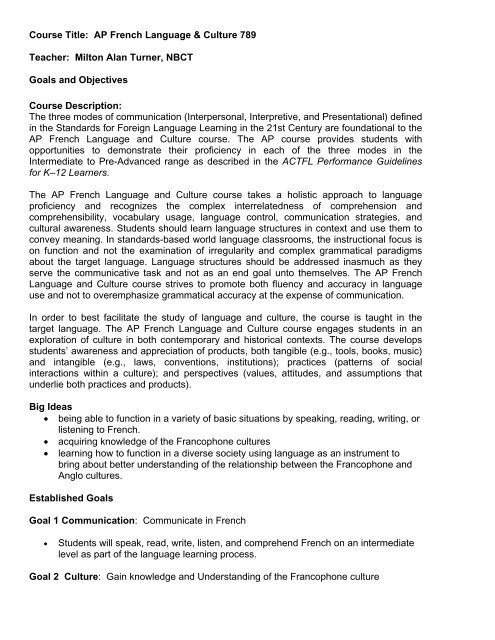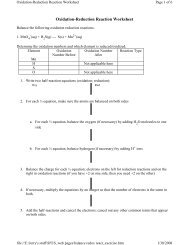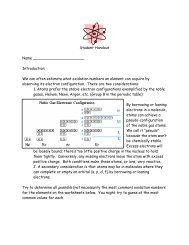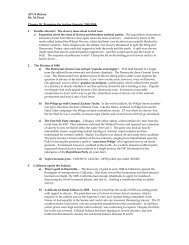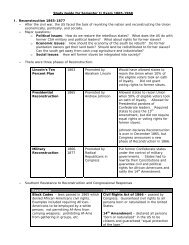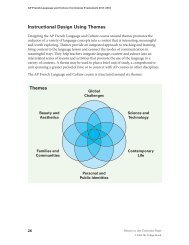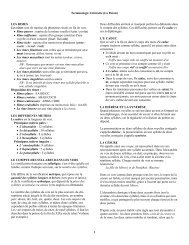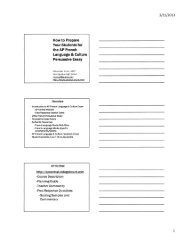AP French Language & Culture - Saint Ignatius High School
AP French Language & Culture - Saint Ignatius High School
AP French Language & Culture - Saint Ignatius High School
Create successful ePaper yourself
Turn your PDF publications into a flip-book with our unique Google optimized e-Paper software.
Course Title: <strong>AP</strong> <strong>French</strong> <strong>Language</strong> & <strong>Culture</strong> 789Teacher: Milton Alan Turner, NBCTGoals and ObjectivesCourse Description:The three modes of communication (Interpersonal, Interpretive, and Presentational) definedin the Standards for Foreign <strong>Language</strong> Learning in the 21st Century are foundational to the<strong>AP</strong> <strong>French</strong> <strong>Language</strong> and <strong>Culture</strong> course. The <strong>AP</strong> course provides students withopportunities to demonstrate their proficiency in each of the three modes in theIntermediate to Pre-Advanced range as described in the ACTFL Performance Guidelinesfor K–12 Learners.The <strong>AP</strong> <strong>French</strong> <strong>Language</strong> and <strong>Culture</strong> course takes a holistic approach to languageproficiency and recognizes the complex interrelatedness of comprehension andcomprehensibility, vocabulary usage, language control, communication strategies, andcultural awareness. Students should learn language structures in context and use them toconvey meaning. In standards-based world language classrooms, the instructional focus ison function and not the examination of irregularity and complex grammatical paradigmsabout the target language. <strong>Language</strong> structures should be addressed inasmuch as theyserve the communicative task and not as an end goal unto themselves. The <strong>AP</strong> <strong>French</strong><strong>Language</strong> and <strong>Culture</strong> course strives to promote both fluency and accuracy in languageuse and not to overemphasize grammatical accuracy at the expense of communication.In order to best facilitate the study of language and culture, the course is taught in thetarget language. The <strong>AP</strong> <strong>French</strong> <strong>Language</strong> and <strong>Culture</strong> course engages students in anexploration of culture in both contemporary and historical contexts. The course developsstudents’ awareness and appreciation of products, both tangible (e.g., tools, books, music)and intangible (e.g., laws, conventions, institutions); practices (patterns of socialinteractions within a culture); and perspectives (values, attitudes, and assumptions thatunderlie both practices and products).Big Ideas• being able to function in a variety of basic situations by speaking, reading, writing, orlistening to <strong>French</strong>.• acquiring knowledge of the Francophone cultures• learning how to function in a diverse society using language as an instrument tobring about better understanding of the relationship between the Francophone andAnglo cultures.Established GoalsGoal 1 Communication: Communicate in <strong>French</strong>• Students will speak, read, write, listen, and comprehend <strong>French</strong> on an intermediatelevel as part of the language learning process.Goal 2 <strong>Culture</strong>: Gain knowledge and Understanding of the Francophone culture
• Students will learn the background knowledge about Francophone culture inpreparation for the National <strong>French</strong> Exam.Goal 3 Connections: Connect with other disciplines and expand knowledge• Students will recognize those elements in English which are related to <strong>French</strong>.Goal 4 Comparisons: Develop insight into own language and culture• Students will compare and contrast their own culture with that of the Francophoneworld.Goal 5 Communities: Participate in wider communities of language and culture• Students will use their knowledge of Francophone culture in a world of diversecultures.Enduring Understandings1. Express ideas and speculate about events and situations in his own life andsituations in general;2. Express hopes and regrets about personal situations;3. Converse about causes and consequences of an historical event or currentsituation in the target country;4. Participate in a panel discussion and share opinions and viewpoints about aliterary text he has read or a film he has viewed;5. Prepare and deliver a presentation to teach a class about an historical periodor current event in the target culture;6. In collaboration with another student(s), create and present a project thatdescribes and compares attitudes and situations of his own culture incontrast to that of the target culture;7. Write a report, based on authentic sources, about the similarities anddifferences between attitudes and behaviors of adolescents in the home andtarget cultures.Course OutcomesBy the end of the course, the learner will be able to:1. Initiate, sustain and conclude conversations on a wide variety of personal, generalknowledge and academic topics2. Analyze expressive products of Francophone culture (e.g., selections from variousliterary genres, fine arts).3. Analyze literary allusions that represent a cultural awareness of <strong>French</strong> and English4. Compare and contrast graphs and statistical information on various topics (e.g.,population, income) about Francophone cultures with similar information about theU.S.5. Analyze how the media presents political or historical events in the Francophonecultures and in the students’ own culture.
6. Analyze unique differences between Francophone cultures and students’ ownculture and explain the reasons for such differences (e.g., driving habits, use ofeating utensils).7. Explain how actions in Francophone cultures and students’ own culture arereflections of peoples’ beliefs and attitudes (e.g., outside footwear not worn inside).8. Follow complex oral, written or signed directions, instructions and requests (e.g.,automated telephone prompts, product assembly).9. Use listening and reading strategies (e.g., applying prior knowledge) to makeinferences and draw conclusions.10. Present and support an opinion using information from articles, documentaries orhistorical narratives.Essential Questions• How is learning a foreign language relevant in today’s society?• How will understanding a foreign language help one make the world a better place?• To what extent is studying a foreign language satisfying, enjoyable, and confidencebuilding?Knowledge• Vocabulary• Grammar• Knowledge of Francophone civilizations and their contributions to society as a wholeSkillsLISTENING AND ORAL COMPREHENSIONThe student will work toward being able to understand spoken <strong>French</strong> from a variety ofspeakers through teacher’s instruction, in-class listening activities, and practice with peers.The student will understand spoken questions and statements about various topics in thepresent and past.SPEAKING AND ORAL PROFICIENCYThe student will be able to make statements, ask questions, express opinions, and discussbasic aspects of life within the framework of the curriculum. Students will also incorporatepreviously learned material into their oral work. Oral proficiency will be attained through inclasspractice with the teacher and peers as well as through oral quizzes.READINGThe student will be able to understand written materials in <strong>French</strong>, such as brochures,poems, newspaper, magazine, and internet articles, songs, fables, plays and short stories.WRITINGThe student will be able to supply written <strong>French</strong> on forms, e-mails, diaries, and otherdocuments in paragraph form applying grammatical concepts learned in class.GRAMMARThe student will be able to identify the concept of varying verbs, their forms, and their uses.In addition to vocabulary and sentence structure, the student will lean and review the
subjunctive mood and future, conditional, compound and passé simple (literary past)tenses.VOCABULARYThe student will learn and be able to use vocabulary in various areas to discuss topics inthe six major themes of global challenges, science and technology, contemporary life,public and personal identities, families and communities, and beauty and aesthetics.CULTUREThe student will be familiar with the prevalent use of the <strong>French</strong> language around the world.The student will recognize and appreciate the differences in culture between Francophonecountries. The student will discuss traditions of Francophone culture as they differentiateand compare it to American way of life, such as greetings, hobbies, school, family, food,shopping, and holidays.AssessmentsHOMEWORK POLICYIn <strong>French</strong> class, there is no credit for doing homework. It is what students are expected todo. However, missed homework counts against students. For example, if you earn a 91.5(a B+) during a grading period, one missed homework automatically lowers the grade byone letter step to a B. Two missed homeworks automatically lower the grade by two lettersteps to a B-.Homework is a student's key to success. It allows him to practice the tasks he will berequired to perform in class, in oral presentations, and on quizzes, tests, and exams.GRADING POLICY20% Orals20% Compositions40% Tests and Quizzes20% FinalPlease note that copying, cheating, or plagiarism will not be tolerated. Any of theseoffenses will result in failure of the assignment and further disciplinary action.Please note that copying, cheating, or plagiarism will not be tolerated. Any of theseoffenses will result in failure of the assignment and further disciplinary action.TARDY/ABSENCE POLICYThe student guidelines are specific on the policy of tardiness and absences. If a student istardy 3 or more times, a demerit (JUG) will be issued. If a student if absent, he will providethe teacher with a re-admit slip upon his return in order to receive credit for his missedwork.MAKE-UP POLICYIt is the student’s responsibility to approach the teacher about missed work and make-upwork. The amount of time given to complete make-up assignments depends upon thelength of the student’s absence. The teacher and the student will determine this timelineon an individual basis.
If a student is absent on the day of a test, he will make the test up at a time that isconvenient to both the teacher and the student.Methodologies and Instructional StrategiesVarious methodologies are used in the classroom. The class will begin with a prayer eachday, which will be student led and used as a way to get into the <strong>French</strong> mode. Lectures areused in order to teach new material. Throughout each chapter, CD’s are used for listeningexercises and students will make flashcards in order to practice vocabulary and prepare fororal quizzes. Vocabulary and grammar games are often used to review and learn newconcepts as well.Cooperative learning is essential in the <strong>French</strong> classroom because proficientcommunication is a highly important goal of the class. Students often learn with their peersthrough practicing their <strong>French</strong> together, working on assignments, or preparing for an oralquiz. When students prepare for a quiz, they will speak with another student with whomthey did not practice in order to prevent memorization and encourage working towardnormal conversation.In order to learn a language, it is imperative to practice it through speaking. Thus, it is vitalthat students participate often in class. A large part of the oral grade will be based on pairand group activities in class.Movies, music, and interactive tutors are also used in the classroom. The video programthat accompanies the text, which follows Francophone teenagers through school andhomelife, will be frequently implemented.Computers and the internet are important tools as well. They will be used to help thestudents practice grammar skills along with allow them to become a part of theFrancophone world. Using the internet, students can access <strong>French</strong> newspapers, radio,and television.Learning Experience*Lecture/class discussions* Activities via games, challenges, computer programs* Movies and class discussions* Co-operative learning activitiesIntervention Strategies*Individual tutoring*Peer tutoringTexts• Reprises, NTC• Quant à moi, Bragger & Rice• Trésors du temps, Lenard• Douze contes de Guy de Maupassant• selected poems• Ensemble: <strong>Culture</strong> et Société (6e edition), Comeau, Lamoureux, Tranvouez
Class Rules/ExpectationsAll students should respect each other, themselves, all property, and the teacher at alltimes. In foreign language, respect is most important because students must step outsidetheir comfort zones and take risks to practice and learn. Disrespect will not be toleratedand will be dealt with according to school policy and the teacher’s discretion.The students will be presented with numerous opportunities for success in the class viahomework and quizzes. The successful student will take advantage of these opportunitiesand consistently turn in complete homework that is complete and on time. Test will bechallenging but students who are prepared will capitalize on their early preparation viaquizzes and homework. If a student is struggling tutoring is available to them at a mutuallyacceptable time.Technology Integration• Quant à moi activitieso http://www.wadsworth.com/cgiwadsworth/course_products_wp.pl?fid=M20b&product_isbn_issn=9781428231320• Trésor du temps activitieshttp://www.glencoe.com/sec/worldlanguages/french/tresor_du_temps/index.html• Faculty web site http://faculty.ignatius.edu/turner/• DVD’s/Clips/PowerAcademic Integrity PolicyRefer to student hand book for the school’s policy regarding academic integrity.Department Plagiarism PolicyRefer to student hand book for the school’s policy regarding plagiarism.Teacher AvailabilityDuring the school year, I will usually be available to students at school during the morningsbetween 7:30 to 8:00 a.m. on Monday-Friday and mostly everyday after school until around4:00 p.m. If a student needs to see me at another time, arrangements will gladly be made.*Parents: If you have any questions/concerns, I can be reached by email atMTurner@ignatius.edu .Grades will be posted on Net Classroom every two weeks.


